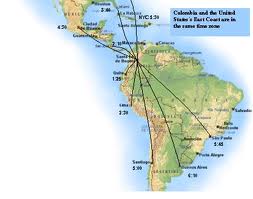Recently, the internet has been jammed with stories and opinions about the Free Trade Agreement and it is unlikely that there will be a slowdown in commentary and opinions anytime soon. This one by Michael Shifter, President at The Inter-American Dialogue is concise and on point as to the reality of the situation. While directed to the Agreement with Colombia, it is appropriate for Panama as well.
First, an Impact statement from the Dialogue that introduces this forum:
“The Dialogue brings together leading citizens from throughout the hemisphere who incorporate a diversity of political and professional perspectives, yet share a commitment to democratic rule, social equity, and economic cooperation in the Americas. Our mission is to convene these leaders to help build productive ties among Western Hemisphere nations.”
By Michael Shifter
El Colombiano October 18, 2011
A Spanish version of the article is available here.
Someday, someone will write the full and objective history of the US-Colombia free trade agreement, which the US Congress approved — finally — on October 12, 2011. (Agreements with Panama and South Korea also passed). For the United States, the history is not a happy one. It reflects badly on a country, and a political system, that unfortunately is increasingly tied up in knots and seems incapable of advancing its own national interests.
To be sure, there is reason to welcome passage of the agreement, even though the process was embarrassingly prolonged. The agreement will likely yield positive economic benefits for Colombia and the United States. These benefits will, however, be more modest than champions of the pact have proclaimed. As in all trade deals, there will be losers as well as winners. More significant than the economic gains are political and long-term strategic advantages for both countries.
Still, it is hard to celebrate this moment. The agreement should have been approved five years ago, after it was signed by Presidents Uribe and Bush, and subsequently approved by the Colombian congress. And it should have been approved for the right reasons — to pursue a sensible trade agenda and solidify a close and longstanding bilateral relationship.
Instead, Colombia too often found itself as a political football caught in petty battles between Democrats and Republicans, the Executive and Congress. Though Republicans were more supportive of the agreement than Democrats (as clearly seen in the final vote in Congress), both parties bear some responsibility for the extended impasse.
As many Colombians discovered when they came to Washington to make their case either for or against the agreement, the debate had little to do with the merits of the agreement, or US interests in Colombia. It had everything to do with narrow agendas and political games.
The trade pact’s supporters, in the US Congress as well as Presidents Bush and Obama, deserve credit. With over 9 percent unemployment, and the US public more and more anxious about globalization, the conditions were hardly favorable. In the end, the right thing happened, and with rare bipartisan support.
Without the agreement (and the one with Panama as well) any talk of a serious “partnership” between the United States and Latin America would be laughable. And without the agreement President Obama would have been extremely uncomfortable at next April’s Summit of the Americas meeting in Cartagena.
It is tempting to interpret the pact’s approval as a step in reenergizing the trade agenda and US engagement with Latin America. But there is no sign that development is likely to take place. Rather, the US Congress worked on an unfinished agenda, which had started with NAFTA in 1993 and the Summit of the Americas in 1994 in Miami.
Fortunately, the trade pact was passed, but the fact that the outcome could easily have been different – and politicians proved to be so shortsighted — is not reassuring.
In Colombia, the question is whether a confident country with an ambitious agenda is sufficiently prepared to take advantage of the opportunity afforded by the agreement. In the United States, the question is whether the agreement will be followed by more action on economic cooperation — or by political paralysis.
